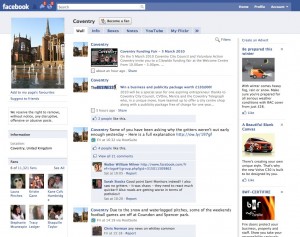The second Wednesday guest post! Thanks to Sarah for this great post – if you’d like to contribute, just email me – and being called Sarah isn’t necessarily a requirement!
Online communication isn’t always taken seriously. It’s a nice to have on top of offline work or something organisations have been told to do. It isn’t necessarily considered a channel in its own right. And those that work online aren’t always respected in terms of their skills, their knowledge or the value they can bring.
Convincing others of your worth within an organisation is sometimes a bigger hurdle than convincing them of the value of online communications.
So, how to go about raising your profile and getting social media offerings to the table? I’ve worked up a list of five approaches. This list isn’t exhaustive. I’d like to hear people argue against or add their own take and experience.
1. Passion
Fall in love with online but don’t be blind to limitations and suitability. Talk to anyone who will listen about the possibilities but respect their concerns. Be able to explain why you are passionate about online – have examples of where social media has helped improve life, improved efficiency (internally or for citizens) or has saved money (pick according to your audience). Be savvy and believe in what you’re trying to get others to see the value of. And while being a geek is something to be cherished try to remember than social media is about being social so get out there and talk!
2. Persuasion
You may be the only person that believes that online communication, social media and digital engagement has an important part in your organisation. This can lead to frustration, doubts about your sanity and a relentless need to persuade others to listen to your suggestions. A good way to get people to listen to you is to listen to them – why don’t they value / understand / like online? Once you understand where they are coming from you can work out how best to showcase options to them. They still might not be sold but at the very least they will be more aware of what social media is (and probably think you’re a decent, reasonable sort as well).
3. Persistence
Things move slowly in the public sector, and social media is developing fast. Be the middle ground between the need to develop strategy, policy, protocol and being left behind because by the time you get to the dock that particular online ship has sailed.
Just because the answer is no today doesn’t mean the answer will be no tomorrow. Keep making suggestions, keep listening to the concerns around the use of social media, keep trying out ideas. Just keep on keeping on.
4. Private sector attitude
If you believe you could lose your customers to a competitor you’ll try harder to be the first with innovation and the best with services. We’re all citizens as well as public sector employees so what use of social media would make your personal dealings with the council easier? What would your neighbour, your mum, your friends find more useful. In the private sector you need to get the edge on your competitors and by having this attitude in the public sector you’ll get closer to delivering above and beyond what is expected and be able to prove why what you’re doing is of value to the organisation.
5. Play, practice, prove
Alright, that’s not one but three things. I really mean knowing what you’re talking about. Being passionate and persuasive will come more naturally if you use and know social media. The Internet is a playground so don’t be afraid to try out new platforms and ideas. Get to know other people in the sector and find out what they’re doing, share your ideas and experience with them. Collectively we can be more innovative and efficient than working in silos. And gather your evidence. Know how many people are online and using social media, know the demographics of different platforms, know how far you reach with online communications, know what your citizens think of what you’re doing. Know which tool to use for which job.
So, what do others think? Anyone used a different approach or mix in order to get word out about what they can do for the organisation with social media?
 Sarah Lay blogs at www.sarahlay.com, works in online communications for Derbyshire County Council (who don’t necessarily share her views) and is studying for a Masters in eCommunications, concentrating on local government use of social media. She is also the organiser of the first social media cafe for Derby and Derbyshire. If you live or work in the area and are interested in online communications and social media come along to meet others – find out more and join the group.
Sarah Lay blogs at www.sarahlay.com, works in online communications for Derbyshire County Council (who don’t necessarily share her views) and is studying for a Masters in eCommunications, concentrating on local government use of social media. She is also the organiser of the first social media cafe for Derby and Derbyshire. If you live or work in the area and are interested in online communications and social media come along to meet others – find out more and join the group.



 Sarah Lay blogs at
Sarah Lay blogs at